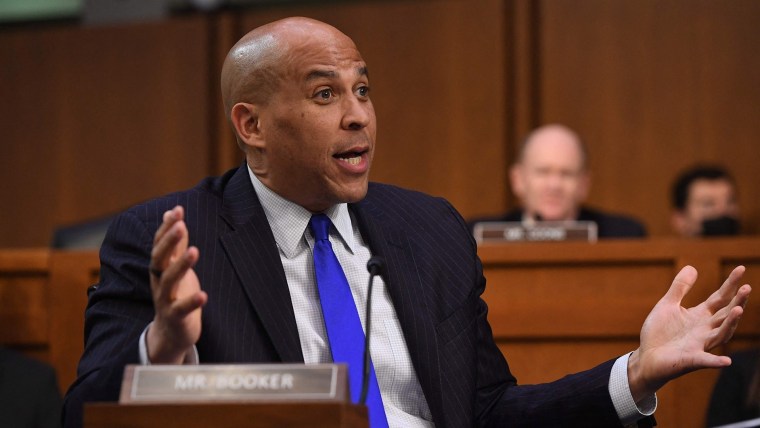WASHINGTON — The first day of the Senate hearings for Supreme Court nominee Ketanji Brown Jackson offered a sharp contrast between the two parties: Democrats focused on the nominee and many Republicans vented about past judicial fights and railed against “dark money.”
The Judiciary Committee proceedings Monday included opening statements from senators and ended with introductory remarks from Jackson, 51, who is a judge on the U.S. Court of Appeals for the District of Columbia Circuit. Questioning begins Tuesday.
“I have been a judge for nearly a decade now, and I take that responsibility and my duty to be independent very seriously. I decide cases from a neutral posture,” Jackson said. “I evaluate the facts, and I interpret and apply the law to the facts of the case before me, without fear or favor, consistent with my judicial oath.”
Here are some of the highlights:
The trauma over past Supreme Court battles runs deep — and Republicans didn’t hide it.
Sen. Chuck Grassley, R-Iowa, the top Republican on the committee, began his party’s remarks at the hearing by reminding of previous confirmations when the audience interrupted him.
He knocked Democrats for falsely predicting that then-Judge Amy Coney Barrett would vote to destroy “Obamacare.” He and Sen. Lindsey Graham, R-S.C., vented about Democrats’ treatment of then-Judge Brett Kavanaugh.
“Most of us couldn’t go back to our offices during Kavanaugh without getting spit on,” Graham said, promising Jackson that her hearing “won’t be a circus.”
Graham dug back about 20 years to complain about Democrats’ treatment of President George W. Bush’s appellate nominees Janice Rogers Brown, a Black woman who was ultimately confirmed, and Miguel Estrada, a Hispanic man who was filibustered.
March 21, 202202:53
Sen. Ted Cruz, R-Texas, said the Kavanaugh hearing was “one of the lowest moments in the history of this committee” and complained about the Democrats’ treatment of Robert Bork (who was criticized as extreme and defeated by a bipartisan vote in 1987) and Clarence Thomas (who was confirmed in 1991 after allegations of sexual misconduct from Anita Hill).
“We started down this road of character assassination in the 1980s with Judge Bork’s hearings and senators have been engaged in disgusting theatrics ever since,” Sen. Ben Sasse, R-Neb., said.
Democrats showered Jackson — sometimes known in D.C. circles by her initials “KBJ” — with praise for her experience as a federal judge and public defender, with Sen. Cory Booker, D-N.J., hailing the historic implications of her nomination. But many Republican skeptics, with some exceptions, had little to criticize about her and focused their fire on her liberal supporters.
In his opening remarks, Grassley lamented “the troubling role of far left dark money groups, like the Demand Justice have played in this administration’s judicial selection process.”
Sen. John Cornyn, R-Texas, said groups like Demand Justice “have paid millions of dollars” to try and “promote court packing and sow public distrust in the legitimacy of the Supreme Court.”
March 21, 202200:45
The group, which is co-founded by Democratic strategist Brian Fallon and Obama administration counsel Christopher Kang, responded: “Senate Republicans’ obsession with talking about Demand Justice at Ketanji Brown Jackson’s confirmation hearings is the ultimate tell that they have thrown in the towel on putting up a meaningful fight against Jackson’s nomination.”
The group said Republicans’ “side arguments about outside liberal groups offers a detour from having to frontally attack Jackson.”
Graham invoked a liberal dark money group that has backed several advocacy organizations.
“What is it about your nomination that the most liberal people under the umbrella of Arabella threw in their money, their time, their time, their support?” He added: “I want to know more about that.”
Sen. Sheldon Whitehouse, D-R.I., a proponent of requiring donor disclosures and a frequent critic of conservative dark money groups, appeared impatient with GOP senators repeatedly criticizing “dark money” — as the same lawmakers fight to preserve laws that allow donors to contribute large sums to money for political causes without disclosing their identities.
“We’ve already seen dark money groups use dark money to run ads charging that dark money swayed this selection. We’re hearing that again today,” he said. “Ironic when hundreds of millions of dollars in right-wing dark money built the current court majority.”
The Republican cohort on the Judiciary Committee includes numerous potential presidential aspirants — including Cruz, Sen. Tom Cotton, R-Ark., and Sen. Josh Hawley, R-Mo. All of them used some of their opening remarks to film an audition tape.
Cruz, the GOP runner-up in the presidential contest, promoted his podcast and offered red meat to conservative voters, knocking fringe figures on the left who want to “abolish the police” and noted that “murder rates, carjacking rates and crime rates soar across the country.”
March 21, 202202:11
Cotton inveighed against teachers’ unions and “racist vitriol known as critical race theory.” He went after liberal financier George Soros, illegal migration at the Southern border and Biden administration policies on “catch and release” and Covid-19. He railed against “the abortion lobby” and left-wing calls to expand the Supreme Court.
Hawley criticized Jackson’s sentencing record when it comes to child pornography, insinuating that she was too lenient. Democrats pointed to various fact checks debunking or challenging his claim, including by the conservative National Review, which called it a “disingenuous attack.” Other critics said Hawley was pandering to the far-right conspiracy group QAnon.
The hearings took place amid a war in Ukraine instigated by Russia, which one Democratic senator cited as a reminder to protect democratic institutions like an independent judiciary.
Sen. Amy Klobuchar, D-Minn., said the Jackson hearing “comes at a moment in our history when the people of this country are once again seeing, this time in Ukraine, that democracy can never be taken for granted.”
“Eternal vigilance, it’s been said, is the price of liberty,” she said. “That’s the pivotal moment we’re in. That’s your moment. It’s a time for us to consider what the courts mean to our democracy.”
Thomas Griffith, a former conservative appeals judge, introduced Jackson on Monday as a judge who will be “unwavering” in her commitment to neutrally applying the law.
“The rule of law is a fragile possibility in the best of times,” he said. “Today, it is literally under attack in Ukraine and is threatened around the world and in our own country by autocrats and their sympathizers who give lip service to the rule of law but then work to undermine it at every turn.”



